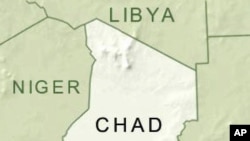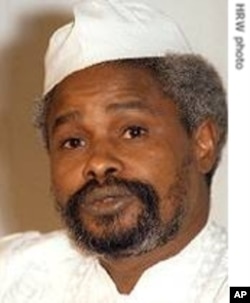On Wednesday, the victims of politically motivated killings and torture allegedly carried out in the 1980’s by former Chadian president Hissene Habre will mark the 10th aniversary of his indictment by a judge in Senegal. Habre has yet to stand trial, either in Senegal, where he has lived in exile for the past 17 years, or in Belgium, which indicted him in 2005 for war crimes, crimes against humanity, and torture.
The African Union, which is meeting through Wednesday in Addis Ababa, is reportedly crafting a progress report on Senegal’s preparations to prosecute Habre. But Dakar attorney Mouhamed Kebe, who represents several of the surviving Chadians, says he’s skeptical about their progress, but hopeful that a demonstration in the Chadian capital Ndjamena on Wednesday can spur the African leaders to take action.
“We have some demonstrations in Ndjamena, a march, some rallies, and we are also trying to see to what extent we can discuss this in a society of religious people here (in Senegal) in order to make them understand that they should be in solidarity with the victims there and to see how they can help them and push in order to make this happen,” he suggested.
Kebe says as the years unfold without any action, the number of victims dwindles, and further delays only lessen the likelihood that Chadian survivors will see justice done.
“Definitely, we want to make this prosecution and this trial happen because the victims are waiting for 10 years, and a few of them have passed away and others are always suffering. So they want to see this prosecution and this trial happen,” he said.
Under a universal jurisdiction law, Belgium sought Senegal’s help in extraditing Habre to trial in Europe after his first indictment was thrown out in Senegal on a technicality. But the African Union stepped in and asked Senegal in July, 2006 to prosecute Habre “on behalf of all Africa,” a move that attorney Kebe says in effect blocked the European initiative and placed the onus back on Senegal.
“We cannot say that something very concrete has been done. We have to keep in mind that Belgium requested from Senegal to extradite him (Habre) to Belgium to try him, and that the African Union asked Senegal not to extradite Habre to Belgium in order to prosecute and to try him on behalf of Africa. So since they are jeopardizing the mission of another country to make this happen, they (the AU) should do so (help Senegal) because it’s their obligation to make it happen,” he said.
Although European countries continue to facilitate the Dakar government’s ability to host a trial with offers of funding, Kebe says the ball is in Senegal’s court to overcome delays in finding a facility to house the trial and what he says is a reluctance by Senegalese officials to come up with a credible budget for their European allies, Belgium, France, the Netherlands, and Switzerland to help fund.
“The European Union has always expressed its commitment to help Senegal and to give funds. In my understanding, Senegal has not given the European Union a concrete document which can explain exactly what are the steps to go ahead. In my opinion, it is Senegal’s obligation to give something very, very clear in terms of proposals which can allow the EU to fund and to give assistance,” he said.
In Addis Ababa at the AU summit, African leaders are debating how to give the organization greater influence to act against power grabs, unconstitutional changes of power, and a growing number of presidents who have extended their rule and refused to relinquish power. Speaking for his Chadian clients, attorney Kebe says he hopes that the African Union summit will not squander another chance to encourage Senegal to bring Hissene Habre to justice.
“African states are not very willing to see this trial happening. The reason is that Habre is one among many past dictators who should be tried. And the prospect of seeing Habre prosecuted and tried is not a very good sign for them because they may be thinking still that tomorrow, it can be (done to) them. This is why many presidents or many ex-presidents who are in the situation like that of Habre don’t want to see this happen. That’s maybe why they don’t push,” he explains.
In December, a joint team from the European Union and the African Union travelled to Senegal with the intention of drafting a budget that would ultimately permit Senegal to put the Chadian dictator on trial.
To coincide with the 10th anniversary of Habre’s indictment, human rights groups have released a new study that demonstrates Habre’s full involvement in tracking and ordering the deaths and torture of hundreds of prisoners operated by his political police, the feared Chadian Documentation and Security Directorate (DDS).
Chadian lawyers for the victims claim that Habre kept in direct communications with his security chiefs about the status of hundreds of detainees during the 1980’s, that thousands of victims are mentioned in the documents, and that 1,208 prisoners are detailed as having died in detention.





